Top 20 PhD Programs in Special Education
Reviewed by Mary McLaughlin, Special Education Teacher; M.S. SpEd

Heading to graduate school for a Doctor of Philosophy is an option worth considering for special educators seeking career advancement. The PhD in Special Education is a terminal degree that provides the highest level of research-based methods for studying and developing new pedagogical tools that improve outcomes for exceptional children. Many PhD graduates enter faculty positions in higher education to teach tomorrow’s teachers. The BLS predicts faster-than-average job growth in academia at 13 percent through 2024. University-level education professors report a mean annual wage of $70,260. Education PhD holders could also become special education directors, school principals , curriculum developers, superintendents, and childcare administrators.
Therefore, we’ve constructed the following list of the Top 20 Ph.D. Special Education Programs in the United States. We consulted with the U.S. News and World Report rankings to narrow down the best campus-based colleges for graduate teaching degrees. We visited the website for each high-ranking school to find Ph.D. programs, which are more scientific and lab-oriented than Ed.D. degrees. Our ranking favored programs offering several degree specializations. Special priority was given to teacher programs accredited by the Council for the Accreditation of Educator Preparation (CAEP) or similar entities. Other conditions considered were doctoral tuition support, graduate assistantships, student-faculty ratio, admission selectivity, academic rigor, and dissertation opportunities.

1. University of Wisconsin – Madison

Image Source
As a “Public Ivy,” land-grant institution with RU/VH status, the University of Wisconsin-Madison stands upon 936 urban acres along Lake Monona to educate over 13,800 post-graduates. The U.S. News applauded UW-Madison for the third best graduate education school nationally. Within the NCATE-accredited School of Education, advanced cohorts of four to eight students pursue the 56-credit Special Education Ph.D. program yearly. Over $50 million in extramural funding supports dissertations in the Wisconsin Center for Education Research (WCER).
Doctoral Tuition: $791 (in-state) or $1,623 (out-of-state) per credit
Learn more about the Top PhD Programs in Special Education at the University of Wisconsin – Madison here.
2. Columbia University

Endowed for $9.04 billion, Columbia University is a private, Ivy League AAU member founded in 1754 before the Declaration of Independence that’s now enrolling around 19,500 post-grads on 299 urban acres in Upper Manhattan. The U.S. News ranked Columbia’s Teachers College seventh nationally for best graduate education. Special educators have several doctoral options, including a Ph.D. in Applied Behavior Analysis, Ph.D. in Intellectual Disability/Autism & Severe/Multiple Disabilities, or Ph.D. in Deaf and Hard of Hearing, with CAEP approval.
Doctoral Tuition: $9,072 (half-time) or $18,144 (full-time) per semester
Learn more about the Top PhD Programs in Special Education at Columbia University here.
3. Vanderbilt University

Attracting 5,800 post-grads from 90 foreign countries, Vanderbilt University is a private, nonprofit RU/VH institution in the 568 Group that’s located on a 330-acre urban campus in Middle Tennessee near midtown Nashville. According to the U.S. News, the Peabody College is tied for America’s seventh best graduate education school. The NCATE-accredited Ph.D. in Special Education provides four tracks: Early Childhood, High Incidence, Severe Disabilities, and Visual Impairments. Doctoral candidates also contribute to Vanderbilt’s premier Kennedy Center Research on Human Development.
Doctoral Tuition: $1,854 per credit hour
Learn more about the Top PhD Programs in Special Education at Vanderbilt University here.
4. University of Washington

Affiliated with seven Nobel Prize laureates, the University of Washington is a public, land-grant APRU institution in the Pac-12 Conference that’s endowed for $2.9 billion and serving over 14,600 post-grad Huskies from 703 acres in Seattle. The U.S. News placed the UW College of Education ninth nationally for graduate teaching programs. Offering tuition waivers and $1,700 monthly stipends, the Ph.D. in Special Education degree has three specializations: High- and Low-Incidence Disabilities, Secondary Education, and Applied Behavior Analysis.
Doctoral Tuition: $5,992 (in-state) or $10,404 (out-of-state) per quarter
Learn more about the Top PhD Programs in Special Education at the University of Washington here.
5. University of Texas at Austin

Led by president Gregory L. Fenves, the University of Texas at Austin occupies 434 urban acres as a flagship public, space-grant RU/VH institution with 11,350 post-graduates. UT-Austin has America’s 11th best graduate education according to the USNWR. Linked to the Texas Center for Disability Studies, the Ph.D. in Special Education program lets Longhorns choose from four concentrations: Autism & Developmental Disabilities, Early Childhood Special Education, Learning Disabilities & Behavioral Disorders, or Multicultural Special Education.
Doctoral Tuition: $5,062 (in-state) or $9,232 (out-of-state) each semester
Learn more about the Top PhD Programs in Special Education at the University of Texas at Austin here.
6. New York University

New York University is a private, nonprofit RU/VH institution with an $8.04 billion budget to educate over 24,300 post-grad Violets from a 230-acre urban campus in Greenwich Village. Founded in 1890, NYU’s Steinhardt School was ranked 13th nationally for best graduate education by the U.S. News. Holding CAEP accreditation, the 60-credit Ph.D. in Teaching and Learning program offers a Special Education emphasis. Students work with poverty-impacted children at 25 partnering schools in East Harlem and South Bronx.
Doctoral Tuition: $10,390 (half-time) or $20,368 (full-time) per year
Learn more about the Top PhD Programs in Special Education at New York University here.
7. University of Oregon

Boasting over 195,000 living alumni, including Columbia’s President Lee Bollinger, the University of Oregon is a flagship public, Pac-12 RU/VH institution endowed for $758 million on a 295-acre urban campus in Eugene along the Willamette. The U.S. News ranked the UO College of Education 14th nationally. Linked with the award-winning Pearl Duck Autism Center, the Ph.D. in Special Education offers five emphases in Positive Behavior Support, Low-Incidence Disabilities, Early Intervention, Prevention & Academic Intervention, and Secondary/Transition Services.
Doctoral Tuition: $16,602 (in-state) or $27,591 (out-of-state) each year
Learn more about the Top PhD Programs in Special Education at the University of Oregon here.
8. University of Kansas

Chartered in 1864 after “Bleeding Kansas” ended, the University of Kansas is a flagship public, land-grant AAU member with a $1.86 billion endowment and 28,100 Jayhawks enrolled on its spacious 1,100-acre urban campus on Mount Oread. Kansas placed 17th for best graduate education school according to the U.S. News. Taking a scientific-practitioner model, the Ph.D. in Special Education maintains CAEP accreditation for six specializations, such as Early Childhood Unified, Instruction Design and Technology, and Special Education Policy.
Doctoral Tuition: $402 (in-state) or $909 (out-of-state) per credit
Learn more about the Top PhD Programs in Special Education at the University of Kansas here.
9. Ohio State University

Reporting $652 million in research expenditures, Ohio State University is a public, sea-grant RU/VH institution contributing to the Big Ten Academic Alliance with over 13,500 post-grad Buckeyes studying on its 1,765-acre headquarters in Columbus. The U.S. News ranked the NCATE-accredited College of Education and Human Ecology 18th nationwide. In Ramseyer Hall, students begin the 63-credit Ph.D. in Educational Studies, Special Education program every Autumn with self-designed specializations like Applied Behavior Analysis or Urban Issues in Special Education.
Doctoral Tuition: $12,888 (in-state) or $33,334 (out-of-state) each year
Learn more about the Top PhD Programs in Special Education at Ohio State University here.
10. University of California – Berkeley

Created under the Dwinelle Bill of 1868, the University of California-Berkeley is a public, land-grant IARU member noted for the Free Speech Movement that’s teaching 10,800 post-grad Golden Bears across its 1,232 urban acres in Alameda County. The Berkeley Graduate School of Education was tied for 18th nationally by the U.S. News. Partnering with San Francisco State University, the Joint Doctoral Program in Special Education offers a Ph.D. and access to the UC SPEDDR Center for Research.
Doctoral Tuition: $11,220 (in-state) or $26,322 (out-of-state) per year
Learn more about the Top PhD Programs in Special Education at the University of California – Berkeley here.
11. University of Virginia

Since becoming the South’s first AAU member in 1904, the University of Virginia has grown its $5.85 billion endowment as a flagship public, land-grant RU/VH institution to engage over 6,500 post-grad Cavaliers upon its 1,682-acre historic campus in Charlottesville. UVA’s Curry School of Education holds CAEP accreditation as the 18th best teacher educator nationwide according to the U.S. News. Advanced cohorts can enter the 72-credit Ph.D. in Special Education program specialized in High-Incidence Disabilities or Gifted/Talented Education.
Doctoral Tuition: $15,224 (in-state) or $25,174 (out-of-state) per year
Learn more about the Top PhD Programs in Special Education at the University of Virginia here.
12. Michigan State University
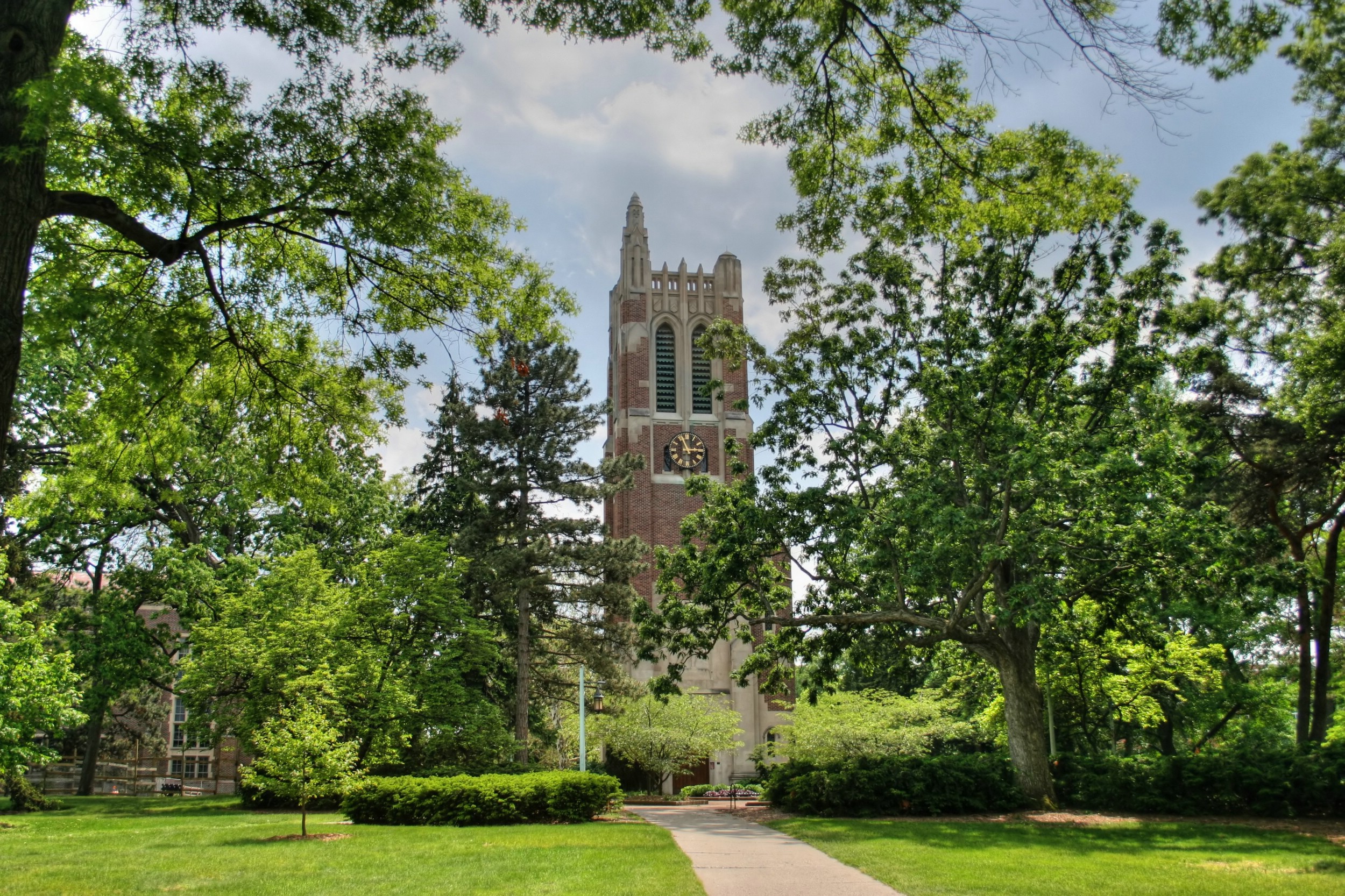
Split into 17 colleges with 11,400 post-grad Spartans total, Michigan State University is a public, land-grant and sea-grant RU/VH powerhouse with a $2.25 billion endowment that occupies 5,200 acres on the Red Cedar River in East Lansing. The U.S. News applauded MSU for America’s 21st best graduate education degrees. Within the CAEP-accredited College of Education, there’s a 67-credit Special Education Ph.D. program available. Doctoral students conduct dissertations in state-of-the-art labs like the Research on Teaching and Learning Institute.
Doctoral Tuition: $698 (in-state) or $1,372 (out-of-state) per credit
Learn more about the Top PhD Programs in Special Education at Michigan State University here.
13. University of Minnesota Twin Cities

Sitting atop a 2,730-acre urban campus in Minneapolis-St. Paul overlooking the Mississippi River, the University of Minnesota Twin Cities is a public, land-grant and space-grant BTAA member with nearly 15,900 post-grad Golden Gophers enrolled. Minnesota’s CAEP-accredited College of Education & Human Development is ranked 21st nationally by the U.S. News. Teachers could earn the 69-credit Special Education Ph.D. degree on-campus. Several are recruited for the National Center for Leadership in Intensive Intervention (NCLii) Fellowships.
Doctoral Tuition: $8,120 (in-state) or $12,560 (out-of-state) per semester
Learn more about the Top PhD Programs in Special Education at the University of Minnesota Twin Cities here.
14. University of Illinois – Chicago

Easily accessed from the UIC-Halsted Blue Line, the University of Illinois-Chicago is a public, state-funded GCU Coalition member that will “Teach, Research, Serve” with 11,400 post-grad Flames yearly from 244 urban acres on Chicago’s Near West Side. Illinois was ranked 24th for best graduate education by the U.S. News. Adhering to NCATE standards, the 96-hour Ph.D. in Special Education offers practice in the UIC Educational Assessment Clinic and research in the Center for Urban Education Leadership.
Doctoral Tuition: $5,740 (in-state) or $11,860 (out-of-state) each semester
Learn more about the Top PhD Programs in Special Education at the University of Illinois – Chicago here.
15. Utah State University

Established in 1888 from Anthon H. Lund’s vision, Utah State University is a public, land-grant and space-grant RU/VH institution drawing over 3,900 post-grad Aggies from the “Beehive State” and beyond to its 400-acre suburban campus in Logan. According to the U.S. News, USU’s Emma Eccles Jones College is the 26th best graduate education school. Special educators could pursue the 70-credit Disability Disciplines Doctoral Program for seven Ph.D. specializations, including Applied Behavior Analysis, Rehabilitation Counseling, and Special Education.
Doctoral Tuition: $3,138 (in-state) or $9,793 (out-of-state) per term
Learn more about the Top PhD Programs in Special Education at Utah State University here.
16. University of Connecticut

Learn more about the Top PhD Programs in Special Education at the University of Connecticut here.
Belonging to Universitas 21 Global with Ohio State, the University of Connecticut is a public, land-grant, space-grant RU/VH hub located on 4,400 rural acres in Storrs to educate 8,300 post-grad Huskies in New England’s Knowledge Corridor. The NCATE-accredited Neag School of Education has America’s 27th best graduate degrees according to the U.S. News. Full-time students could earn full-tuition coverage for the Ph.D. in Special Education tracks for Literacy Supports, Positive Behavior Supports, Postsecondary Transition, or Early Childhood.
Doctoral Tuition: $7,998 (in-state) or $18,516 (out-of-state) each semester
Learn more about the Top PhD Programs in Special Education at the University of Connecticut University here.
17. University of Pittsburgh

Positioned on 132 urban acres in Western Pennsylvania’s Schenley Farms Historic District, the University of Pittsburgh is a public, land-grant RU/VH center tracing back to 1787 that’s endowed for $3.52 billion and educating 9,800 post-grad Panthers. The NCATE-accredited School of Education is tied for 27th place according to the U.S. News. Special educators have three doctoral options: the Ph.D. in Early Intervention, Ph.D. in Education of Students with Mental & Physical Disabilities, or Ph.D. in Vision Studies.
Doctoral Tuition: $21,260 (in-state) or $34,944 (out-of-state) per year
Learn more about the Top PhD Programs in Special Education at the University of Pittsburgh here.
18. University of Florida
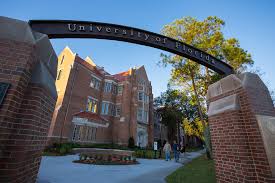
Continuously operating in Gainesville since 1906, the University of Florida is a public, land-grant and sea-grant RU/VH superpower with a $1.46 billion endowment and more than 16,200 post-grad Gators gobbling knowledge on its 2,000-acre suburban campus. The U.S. News ranked UF 29th for best graduate education programs. With NCATE accreditation, the 90-hour Ph.D. in Special Education gives research-oriented training in cutting-edge institutes like the CEEDAR Center. Doctoral candidates could add the Graduate Certificate in Dyslexia or Disabilities in Society.
Doctoral Tuition: $12,740 (in-state) or $30,134 (out-of-state) per year
Learn more about the Top PhD Programs in Special Education at the University of Florida here.
19. University of North Carolina – Chapel Hill

Under Chancellor Carol Folt’s leadership, the University of North Carolina-Chapel Hill educates more than 10,600 post-grad Tar Heels as a public, land-grant SURA member with a $2.89 billion endowment and sprawling 729-acre urban campus near Raleigh. The CAEP-accredited School of Education stood out for America’s 31st best graduate degrees on the U.S. News survey. The 64-credit Ph.D. in Education program offers an Applied Developmental Sciences and Special Education track with emphases like Autism and Early Childhood.
Doctoral Tuition: $11,940 (in-state) or $29,150 (out-of-state) each year
Learn more about the Top PhD Programs in Special Education at the University of North Carolina – Chapel Hill here.
20. Indiana University – Bloomington

Occupying a 1,937-acre urban campus atop Salem Limestone near Giffy Lake Nature Preserve, Indiana University-Bloomington is a public, land-grant URA research institution endowed for $1.98 billion that’s training 10,150 post-grad Hoosiers. According to the U.S. News, the NCATE-accredited W.W. Wright School of Education has the 32nd best graduate teaching degrees. Admitting each January, the Ph.D. in Special Education program grants seven unique specializations, such as Family Supportive Practices, Emotional/Behavioral Disabilities, and Autism Spectrum Disorders Intervention.
Doctoral Tuition: $4,002 (in-state) or $12,161 (out-of-state) per semester
Learn more about the Top PhD Programs in Special Education at Indiana University – Bloomington here.
All schools shown here have been contacted and informed of their inclusion on this list. Schools that do not wish to be featured are immediately removed. School names are the registered trademarks of their original owners. The use of any trade name or trademark does not imply any association with the school.
Become a Special Education Teacher

Masters in Special Education Degree Program Guide
Top 14 online phd in special education programs.
An online Ph.D. in Special Education or online Ed.D. in Special Education will prepare you for one of two career streams: work in a college or university or in a research agency or organization. Programs typically include coursework, a research apprenticeship or dissertation, and practical experiences which help graduates prepare research that will be used to contribute to the knowledge base in special education. You can work toward your degree online, which gives you the flexibility to complete your coursework from anywhere.

We created this list of the top 14 online Ph.D. in Special Education programs. We received our initial list of graduate programs in special education from College Navigator and narrowed down our list to include only those programs offering a Ph.D. or Ed.D. in Special Education. We also included programs that offered special education as a concentration area. Schools selected to be included in our list offer most their coursework online (allowing students to continue living in their current city), have a positive online reputation, are regionally accredited, and have faculty with special education experience. Programs are ranked first by accreditation status, with preference given to schools with NCATE or TEAC accreditation), then by number and length of residency. In keeping with the intention of the article, preference was given to schools that did not require a residency.
Ranking Ph.D. Special Education Online Programs
#14 – gwynned-mercy college – gwynedd valley, pennsylvania, online accelerated executive doctorate of education with a concentration in special education.

Students who have completed a doctoral program but have not yet completed a dissertation may be interested in the Online Accelerated Executive Doctorate of Education with a concentration in Special Education from Gwynedd-Mercy College. This 18-month program matches each student to an advisor who conducts regular dissertation advisement sessions. Most coursework can be completed online, however there are three short residencies required. A practicum experience may also be required as part of the program. Graduates of the program have gone on to become leaders in school districts, colleges, educational policy organizations, and government agencies.
#13 – City University of Seattle – Seattle, Washington
Doctor of education in leadership-specialized study concentration.

City University of Seattle features a flexible Ed.D. program that can be tailored to meet the needs of special education professionals. The program can be completed in just two and half years, and boasts high satisfaction ratings from those surveyed. The online Doctor of Education program has a liberal transfer credit policy which benefits students with extensive work or professional experience. Three residencies are required as part of the program. Each of the residencies focuses on a piece of the dissertation process.
#12 – Grand Canyon University – Phoenix, Arizona
Doctor of education in organizational leadership with an emphasis in special education.

Grand Canyon University offers an online Doctor of Education in Organizational Leadership with an emphasis in Special Education. This 60-credit hour program features an in-depth, research based approach. Students are familiarized with the dissertation process right from the beginning and complete two dissertation themed residencies. Courses cover topics areas such as human development, leadership practices, global history and politics of education, and governance structures in special education. Graduates have gone on to become special education consultants, curriculum developers, policymakers, and school administrators.
#11 – Drexel University – Philadelphia, Pennsylvania
Ed.d. in educational leadership and management concentration in special education leadership.

Drexel University features an entirely online Ed.D. in Educational Leadership and Management with a concentration in Special Education. Students develop the skills needed to lead complex organizations including schools, service agencies, and government offices. This accelerated degree program is offered part-time to allow students to continue working throughout the duration of the program. Students can complete the program in three years. Drexel University offers students personalized academic and career advisement.
#10 – Slippery Rock University – Slippery Rock, Pennsylvania
Doctor in special education.
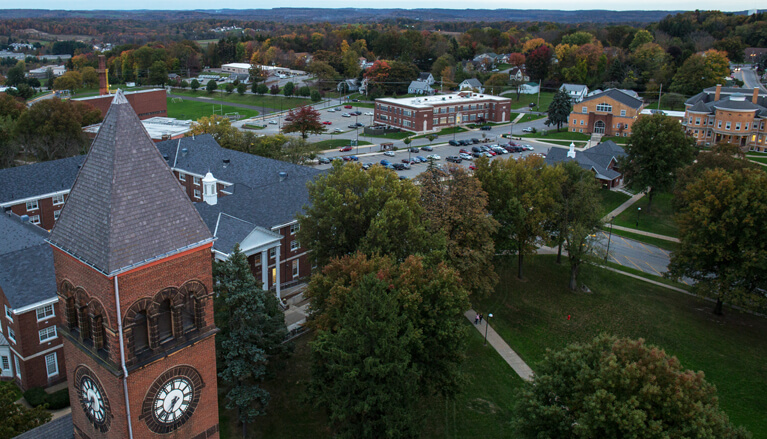
Accreditation : NCATE Slippery Rock University features a Doctor in Special Education that prepares students for leadership positions in the field. Students take both synchronous and asynchronous courses during the fall, winter, and spring semesters. During the summer, there are weekend face-to-face meetings to allow students to engage with faculty. The program follows a cohort model and can be completed in three years of study. Faculty are experienced in the field and work to prepare students to be successful in high demand areas.
#9 – Regent University – Virginia Beach, Virginia
Online doctor of education (ed.d.)-special education.

Accreditation : TEAC Regent University features an online Ed.D. in Special Education with a focus on education research, practice, and policy. Students learn how to interpret data, develop research-based interventions, and understand the history behind best practices. While most courses can be completed online, there is a required four-day summer residency each July. The residency allows students to get together to interact with faculty and gain professional experience. Graduates of the program have become successful in areas related to education research, education policy, education advocacy, and central office executive leadership.
#8 – University of Northern Colorado – Greeley, Colorado
Special education, phd.

Accreditation : NCATE The University of Northern Colorado in Greeley features an online Ph.D. in Special Education. This NCATE accredited program prepares students for leadership positions in both public and private schools, as well as colleges, government organizations, and businesses. The program provides flexibility for students to focus on areas of interest such as autism, behavior disorders, special education research, or university teaching. UNC is home to three different special education training centers which give doctoral students the opportunity to be advocates for change in the field. This 72-81 credit hour program takes between three and five years to complete through a mixture of online and in person courses, allowing special education professionals to continue working while pursuing their doctoral degree.
#7 – Liberty University – Lynchburg, Virginia
Ed. d. curriculum & instruction: special education.

Accreditation : NCATE Liberty University features Ed.D. in Curriculum and Instruction with a focus on Special Education. This 60-credit hour program features three on-campus intensives to allow students to engage with faculty and staff and build relationships with peers. A six-credit hour dissertation is also required as part of the program and requires an on-campus dissertation defense. As part of the program, students learn to use a variety of technology resources to enhance classroom instruction. Graduates are prepared to work in a variety of positions including researcher, school administrator, and university professor.
#6 – Walden University – Minneapolis, Minnesota
Doctor of education (ed.d.) with a specialization in special education.

Accreditation : NCATE Walden University offers an online Ed.D. with a specialization in Special Education that can be completed in two years of study. This 76-quarter hour program includes one three-day, face-to-face residency to allow students to meet with faculty members, share experiences with peers, and work directly with support staff. Students complete two courses every 11 weeks once they have completed the Foundation course. Coursework focuses on real-world case scenarios that are meant to challenge current attitudes and beliefs. A capstone project focused on impacting positive social change is required at the completion of the program.
#5 – University of Colorado – Denver, Colorado
Doctor of education, leadership for educational equity (ed.d.) with a concentration in early childhood special education/early childhood education.

Accreditation : NCATE The Doctor of Education, Leadership for Educational Equity program at the University of Colorado features an innovative concentration in Early Childhood Special Education. The program is ideal for practitioners who want to support young children by improving outcomes. Students will be prepared to work in administrative roles within school districts and organizations and provide leadership and guidance. The program features both a three-year and a five-year track. The three-year track follows a cohort model, with students taking two courses each semester. The five-year track is a more flexible option for working professionals. Students take courses year round and move in and out of different cohorts.
#4 – Nova Southeastern University – Fort Lauderdale, Florida

Accreditation : NCATE Nova Southeastern University offers an Ed.D. with a specialization in Special Education designed for professionals who want to pursue a career as a professor, administrator, or service provider. Students work with a full-time faculty member to create their own individualized program of study that meets their personal and professional goals. While coursework can be completed online, students are required to attend a Summer Institute on campus. The online program allows students to continue in their current employment without needing to relocate to complete their Ed.D. Concentrations are also available in Autism and Applied Behavior Analysis.
#3– West Virginia University – Morgantown, West Virginia
Special education doctoral degree ed.d. online.

Accreditation : NCATE The online Special Education Doctoral Degree program from West Virginia University prepares students for an exciting career working as special education faculty members at the college level. The program follows a cohort model, with courses beginning in the fall semester. Coursework can be completed entirely online. Students engage with faculty and peers through interactive, live sessions. Online students pay the same low in-state tuition rate regardless of their location. Admission to the program is selective and students need to have at least two years of public school teaching experience working with individuals with exceptionalities.
#2 – Concordia University – Chicago, Illinois
Special education leadership, ed.d./ph.d..
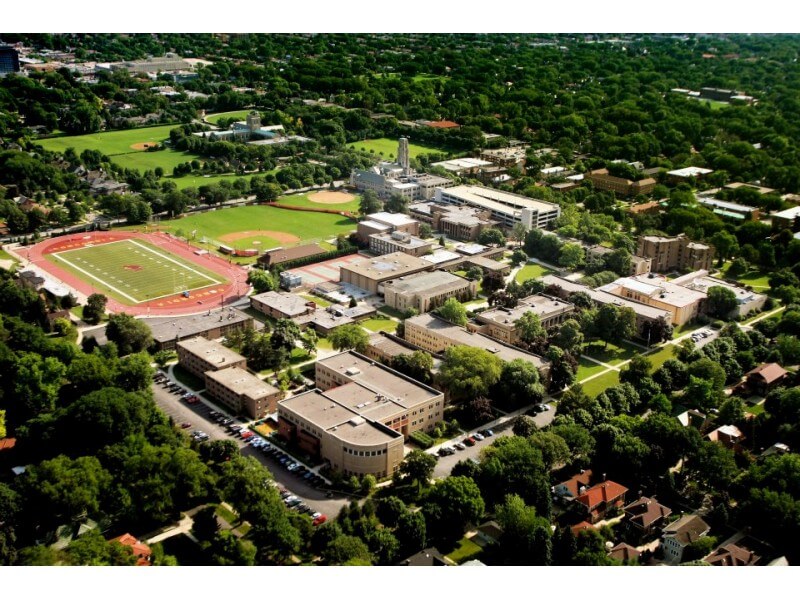
Accreditation : NCATE Concordia University in Chicago features a Special Education Leadership Ph.D. or Ed.D. The Special Education Leadership PhD program is a 67-credit hour research track program that features coursework in research design, quantitative research, survey design, statistics, and qualitative research. The 61-credit hour Special Education Leadership Ed.D. program is a practitioner track program with courses dedicated to special education leadership and advocacy. Courses are offered 100% online, with no on campus residency required. Students complete a comprehensive examination and dissertation to demonstrate the knowledge and skills attained from the program.
#1 – Northcentral University – Prescott Valley, Arizona
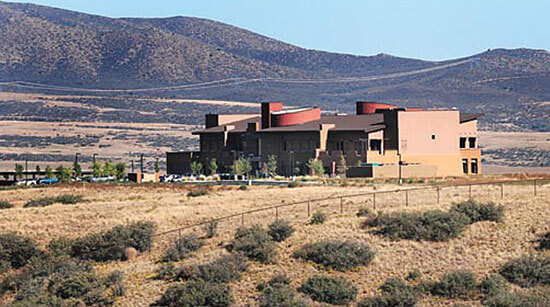
Accreditation : TEAC Northcentral University offers a Doctor of Education degree with a specialization in Special Education with no required on-campus residency. An innovative 1:1 teaching method is used to help students achieve their personal and professional goals. Faculty are experienced in the field and all faculty have earned their doctorate degree. Coursework covers court and legal cases related to special education, federal mandates, case studies, and application of the Individuals with Disabilities Education Improvement Act. Graduates of the program are prepared to work in school administration or in a college disability office helping special education students.
Career Opportunities
Graduates can look forward to career opportunities as faculty members, directors of special education, health services managers, state or federal grant coordinators or school psychologist supervisors.
Be sure to also read:
- Top 20: Ranking the Best Online Master’s in Special Education Programs
- 5 Important Special Education Laws
- What is the Difference Between a Ph.D in Special Education and an Ed.D.?
- 5 Trends in Educational Research
- Is an Online Ph.D. in Special Education Worth it?
- What are Residency Requirements for a Ph.D. in Special Education?
25 Best Online Doctorate in Special Education [2025 Guide]

Special education is a passion for many people, but if you want to distinguish yourself with the highest educational qualification of the field, then an online doctorate in special education may be the path for you.

Earning a doctoral degree is no easy feat, as it consists of several years of intensive coursework and either a dissertation or capstone project. While it does require great commitment and determination, many people find that the hard work is well worth it.
Let’s explore what it’s like to earn a doctoral degree online as well as how an EdD or PhD in Special Education can help you achieve your goals post-graduation.
Editorial Listing ShortCode:
Universities Offering Online Doctorate in Special Education Degree Programs
Methodology: The following school list is in alphabetical order. To be included, a college or university must be regionally accredited and offer degree programs online or in a hybrid format.
1. Ball State University
Ball State University offers a Doctorate in Education along with a Special Education concentration. There’s a general special education track as well as tracks in applied behavioral analysis and autism, high incidence and low incidence teaching and training, and emotional and behavioral disorders. The program is approximately 90% online.
Ball State is accredited by the Higher Learning Commission.
2. Capella University
The PhD in Education program at Capella University features a concentration in Special Education Leadership.
It includes 4 core courses and 10 specialization courses as well as a dissertation, 2 internships, and 3 residencies. Students learn about special education curriculum, instruction, community and family collaboration, financial resources, and laws and regulations.
Capella University is accredited by the Higher Learning Commission.
3. City University of Seattle
Students enrolled in City University of Seattle’s Doctor of Education in Leadership program can select concentrations from organizational leadership, higher education leadership, or specialized study.
The specialized study option opens many additional avenues of study tailored to fit students’ individual needs. The school also offers an endorsement in special education.
CityU is accredited by the Northwest Commission on Colleges and Universities.
4. Drexel University
Drexel University’s Doctor of Education in Educational Leadership and Management program features ten concentrations, including one in Special Education Leadership.
Its goal is to provide students with the skills, resources, and knowledge necessary to become special education program directors. Most students usually finish the program in 3 to 5 years.
Drexel University is accredited by the Middle States Commission on Higher Education.
5. Duquesne University
Students enrolled in Duquesne University’s PhD in Special Education program should learn a lot about social justice, early intervention, assessment, and curriculum design. It’s an 80 credit program that allows both full-time and part-time students to enroll. The program features further specializations in assessment and learning and autism and behavior.
Duquesne University is accredited by the Middle States Commission on Higher Education.
6. Grand Canyon University
Grand Canyon University’s Doctor of Education in Organizational Leadership program offers students a concentration in Special Education.
It’s a qualitative program that focuses primarily on research. The curriculum includes courses such as foundations of research design, qualitative data analysis, results and findings, designing a qualitative study, and special education law.
Grand Canyon University is accredited by the Higher Learning Commission.
7. Gwynedd Mercy University
Gwynedd Mercy University offers a quick and flexible way to earn a doctoral degree with its 54 credit, online, accelerated Executive Doctorate in Educational Leadership program.
Students can choose from four concentrations, including one in Leadership in Special Education. Focus is placed on educational research, teaching, curriculum development, and education policy.
Gwynedd Mercy University is accredited by the Middle States Commission on Higher Education.
8. Liberty University
Liberty University’s Doctor of Education in Curriculum and Instruction program includes a Special Education concentration for students hoping to become special education instructors or program directors, gifted student instructors, or school administrators.
The curriculum focuses on organization and design of gifted education programs, educational assessment, classroom management, and learning theory.
Liberty University is accredited by the Southern Association of Colleges and Schools Commission on Colleges.
9. National University
National University offers a PhD in Education with a Special Education specialization. The program is designed for special education professionals who work in a variety of settings and want to make significant scholarly contributions to the field.
The curriculum involves research and advanced study of topics such as educational equity, inclusion, educational leadership, and methods for monitoring student progress.
National University is accredited by the WASC Senior College and University Commission.
10. Nova Southeastern University
The Doctor of Education in Special Education program at Nova Southeastern University is specifically designed for current education professionals hoping to move into special education leadership positions.
The curriculum is diverse and comprehensive, and students can choose between giving traditional dissertations or completing strategic research projects to earn their degrees.
NSU is accredited by the Southern Association of Colleges and Schools Commission on Colleges.
11. Portland State University
Portland State University offers its educational leadership doctorate program 100% on-campus, 100% online, and in hybrid format. It features multiple specializations from which students can choose. One of these is the special education concentration. It’s main focus is on the leadership of agencies, schools, and communities serving people with disabilities.
Portland State University is accredited by the Northwest Commission on Colleges and Universities.
12. Regent University
Regent University’s Doctor of Education program is a Christian-oriented program designed to train 21st century leaders for every aspect of education.
There are numerous concentrations available, but students hoping to become special education leaders and directors can select the Special Education concentration to learn about special education policy, practice, and research.
Regent University is accredited by the Southern Association of Colleges and Schools Commission on Colleges.
13. Slippery Rock University
The Doctor in Special Education program at Slippery Rock University is for current educators and human service workers who want to transition into special education leadership positions. The degree requires 60 total credits for completion, but students can transfer up to 12 previously earned credits into the program.
Slippery Rock University is accredited by the Middle States Commission on Higher Education.
14. St John’s University
Although St. John’s University doesn’t offer a doctoral degree in special education, it does offer a PhD in Literacy with an optional TESOL and Bilingual Education concentration. This degree can lend itself nicely to careers in special education because of its foundations of literacy and special topics in literacy courses.
St. John’s University is accredited by the Middle States Commission on Higher Education.
15. Texas Tech University
Students in Texas Tech University’s PhD in Special Education program should be prepared for careers as consultants, specialists, teachers, and researchers. The curriculum adheres to the code of ethics put in place by the Council for Exceptional Children and requires 90 credits for completion. Currently, GRE scores are being waived.
Texas Tech University is accredited with the Southern Association of Colleges and Schools Commission on Colleges.
16. University of Alabama
The University of Alabama offers an online Doctor of Education in Special Education with specialized tracks in Leadership, Autism, Collaborative, and Gifted. New sessions begin every fall. The program requires 72 credits, including both coursework and a dissertation. Courses may be synchronous or asynchronous.
The University of Alabama is accredited by the Southern Association of Colleges and Schools Commission on Colleges.
17. University of Colorado – Denver
University of Colorado – Denver’s Doctor of Education in Leadership for Educational Equity program is a special education doctoral degree focused specifically on early childhood learners.
Graduates should understand the issues surrounding inclusive early childhood education, advocate for children with disabilities and diverse abilities, and become effective leaders in the field.
The University of Colorado – Denver is accredited by the Higher Learning Commission.
18. University of Florida
The Doctor of Education in Special Education program at the University of Florida seeks to educate participants in all matters of special education. Students learn to advocate for individuals with disabilities, serve as school leaders and service providers for these individuals, and communicate and work collaboratively with the individuals’ families.
The University of Florida is accredited by the Southern Association of Colleges and Schools Commission on Colleges.
19. University of North Dakota
University of North Dakota’s Doctorate in Education in Educational Practice and Leadership is a 100% online program designed for working educational professionals. The degree takes about 3 years to complete, and there’s a Special Education concentration. Most of the courses in this concentration focus on the field of educational diagnostics.
The University of North Dakota is accredited by the Higher Learning Commission of the North Central Association of Colleges and Schools.
20. University of Northern Colorado
The University of Northern Colorado offers a PhD in Special Education that’s flexible and allows students to customize their courses based on their interests and skills.
The program puts a strong focus on evidence-based practice, research methodology, pedagogy, public policy, collaboration, and educational theory. The school doesn’t charge out-of-state tuition.
The University of Northern Colorado is accredited by the Higher Learning Commission.
21. University of Pittsburgh
University of Pittsburgh offers both a Doctor of Education in Special Education and a PhD in Special Education. The PhD program focuses more on the actual education of students and covers topics like early intervention and education of students with mental and physical disabilities. The EdD in Special Education program is more research-based.
The University of Pittsburgh is accredited by the Middle States Commission on Higher Education.
22. University of Southern Mississippi
The PhD in Education with a concentration in Special Education program at the University of Southern Mississippi requires 66 credits for completion and meets Mississippi state standards for advanced licensure. There are several qualitative research and quantitative analysis courses in the curriculum as well as courses specific to special education.
The University of Southern Mississippi is accredited by the Southern Association of Colleges and Schools Commission on Colleges.
23. University of Toledo
University of Toledo’s Doctorate in Curriculum and Instruction program features a Special Education concentration that focuses on turning educators into special education leaders and directors. It’s a rigorous, 60 credit program that usually takes between 4 and 5 years to finish. Students will participate in several virtual internships as well.
The University of Toledo is accredited by the Higher Learning Commission.
24. University of West Georgia
University of West Georgia’s Doctor of Education in School Improvement program features nine different concentrations as part of its program.
Students who choose the Special Education concentration will take courses in autism instruction and collaboration, autism characteristics and theory, administrating special education programs, special education law, and program planning and evaluation.
UWG is accredited by the Southern Association of Colleges and Schools Commission on Colleges.
25. Walden University
Walden University’s Doctor of Education in Special Education program requires 79 quarter credits, one face-to-face residency, and a doctoral writing assessment to complete.
Graduates are expected to be able to evaluate the ethical and legal merits of policies surrounding special education, implement assessments and interventions, and evaluate special education programs.
Walden is accredited by The Higher Learning Commission.
Special Education Online Doctoral Programs
Achieving a doctoral degree should make you an expert in the field of special education. This could lead to a variety of career paths, including administrative roles in school systems or higher education, research roles for private organizations, and leadership roles for human services agencies.
In a special education doctoral degree program, you will take advanced courses on disabilities and how they affect a student’s education as well as courses on educating gifted students.
Research is also a major focus for a doctoral program. You will likely take statistics and qualitative research courses, which will help prepare you for your dissertation or capstone project of your program.
Research courses will also give you the tools you’ll need to contribute new ideas and information to the body of special education research. These tools will also assist you in staying current in the field throughout your career.
Because there are many laws that impact education, you can also expect to take courses on educational law. This will help you be well-versed on the various methods that comply with the laws of today and of the future.
Special Education Careers & Salaries
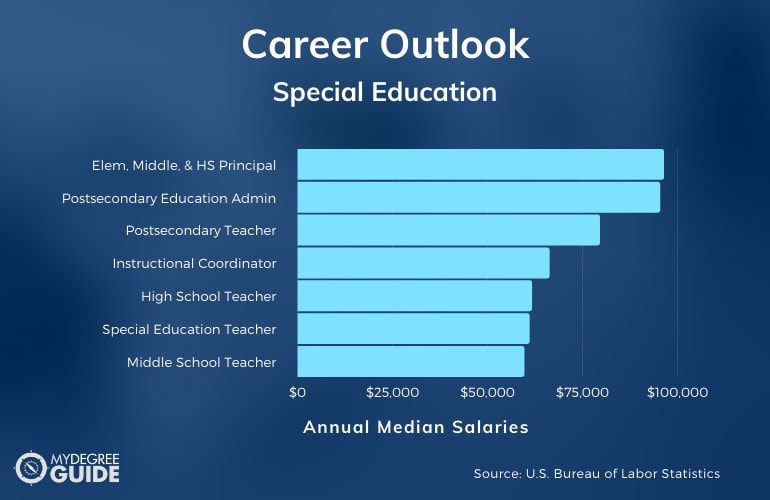
A doctoral degree in special education online can lead to many worthwhile careers, including leadership, teaching, or research roles in school systems, higher education, or other organizations.
With this online degree program in education you could train the next generation of teachers in an education program at a college or university. You could also become an administrator in higher education, potentially leading and directing student success and accessibility departments.
If working in K-12 schools is your goal, then a doctoral degree along with teaching experience would leave you qualified to be a school principal, curriculum designer, or special education department supervisor.
Once you have leadership experience in K-12 education, then you may qualify you to become a school superintendent, a role with great responsibility and high earning potential.
According to the Bureau of Labor Statistics , there are many occupations in the educational field for which someone with a doctoral degree would be qualified.
While some of the occupations listed here may only require a bachelors or masters in special education , a doctoral degree in special education would prepare you for many career paths as an educator, leader, or researcher of special education.
Some of the most common careers for someone holding this degree include school principal, school instructional coordinator, and college or university administrator or professor. You could also work as a leader in an allied human services organization.
There are many occupations that highly value any doctoral degree such as an online doctoral degree in higher education , especially in K-12 and postsecondary administration, so your career path would be uniquely your own.
Choosing an Online Doctorate in Special Education
There are many factors to take into account when choosing a degree program, including cost, time to completion, student to faculty ratio, accreditation, and university reputation.
Here are some special considerations for choosing your online doctorate program in special education:
- Admission requirements : Some doctoral programs are designed for students with only a bachelor’s degree while others require applicants to already hold a master’s degree. Some programs also expect students to have work experience in the education field.
- Length and design : Many online programs are designed for those working full-time, allowing part-time coursework and flexibility in how long it takes to complete the degree. Other online programs are tailored to full-time students who want to complete the program as quickly as possible.
- On-campus requirements : There are 100% online EdD and PhD in Special Education programs, but some universities offer all of the coursework online and still require a few visits to the university campus for dissertation proceedings, when applicable, or intensive seminars.
Every program is different, so it’s important to find the right program that will meet your specific needs, especially since a doctoral program is a great investment of your time and money.
Doctoral Curriculum & Courses
There are many fascinating courses that you will take in an EdD or PhD in Special Education program that will cover laws, disabilities, education, and research. Here are some courses typical of a doctoral degree program in special education.
- Education of Exceptional Children : This course focuses on the needs and psychology surrounding the education of gifted students.
- Law of Exceptionalities : This course typically looks at current laws impacting education in addition to the tools educators will need to understand, interpret, and comply with new laws.
- Law and Higher Education Issues for Students with Autism : This course looks into the legal requirements, in particular the Americans with Disabilities Act (ADA), affecting colleges and universities’ education of students with disabilities and autism and the effective higher education policies on educational support, accommodations, and inclusivity.
- Special Education Policies and Issues : This course will cover social factors affecting people with disabilities, legal requirements of special education, and incorporating community resources.
- Emotional and Behavioral Disorders : An advanced course on the disorders affecting students’ emotions and behavior will look at proven teaching methods, treatment strategies, causes of the disorders, and types of disorders.
- Applied Behavior Analysis : A course on behavioral analysis will typically cover how to conduct an initial assessment of student behavior, determine the most appropriate interventional strategy, assess whether the intervention had a positive effect, and ensure that the positive effects remain in place.
- Introduction of Qualitative Research : Research methods are a major focus in doctoral programs, and a course offering guidance on the many types of qualitative (non-numerical) research will be valuable for educational leaders.
- Research in Special Education : Focusing on methods to conduct effective secondary and tertiary research (rather than primary research), this course will help students hone their skills in finding and analyzing existing data and research.
- Advanced Research Methods : This course will take a deep dive into all research methods and the ways to design studies.
- Grant Writing : A course on grant writing for educators will cover finding grant opportunities, methods for developing grant proposals, and assessing grant outcomes.
Doctoral-level special education courses are incredibly valuable because they teach practical skills, offer knowledge essential for educational leaders, and prepare educators to adapt to new laws and develop better teaching practices.
Admissions Requirements
Most universities have fairly standard admissions applications.
Here are a few components of an application that you should expect to be requested:
- Statement of Goals : Doctoral programs often look for goal-oriented students who are committed and driven to successfully complete the program, so an essay detailing your professional goals and how the degree will allow you to accomplish them is usually required.
- Bachelor’s and Master’s Degree Transcripts : Official transcripts from the college or universities where you earned your bachelor’s degree and master’s degree (if required for admission) are needed.
- Writing Sample : Some programs require a sample of writing you completed for a previous academic program to assess your strengths in writing and research.
Other components of a doctoral degree program admissions application that you might encounter, depending on the institution, include recommendation letters, GRE or GMAT scores, and sometimes an admissions interview.
Accreditation
When choosing a doctoral degree program, it is important to find out if universities you’re considering are accredited by a regional accrediting organization .
To be accredited, a college or university must prove that they are meeting their mission through their programs and services and maintaining academic rigor and integrity. To prove this, institutions must engage in a consistent process of self-assessment and continually seek to improve themselves.
Accreditation often speaks to the quality of a college or university. Because doctoral programs are such an investment of time and funds, you may want to make sure that the university you choose is well-respected.
Financial Aid and Scholarships
Student loans are usually available for doctoral students who qualify. Students seeking these opportunities will need to complete the Free Application for Federal Student Aid (FASFA) .
Your chosen university may also have scholarships and grants available that you may be eligible to apply for. Unlike a loan, grants and scholarships do not need to be paid back, so they are the most cost-effective funding opportunity to inquire about.
Many graduate students find that they are able to fund their education through a mix of loans and scholarships or grants. Cost and funding are important factors to consider when choosing your degree program, so it’s always advisable to inquire about funding opportunities early on in the admissions process.
What Can You Do with a Special Education Doctorate?
A doctoral degree in special education can prepare you to be a leader in the education field. You may qualify to be an administrator, teacher, professor, or researcher.
In a school system, you may be a school principal, curriculum designer, or special education department supervisor. In higher education, you may be a professor or administrator of academic or student affairs.
Your career may also lead you to a position as an educational researcher for a private organization or to a leadership position at a human services nonprofit.
How Much Does an Online PhD in Special Education Cost?
Although tuition rates vary, you can expect to pay between $450 and $595 per credit hour when pursuing a doctorate in special education.
Cost and how you can fund your degree are always critical factors to consider when selecting your degree program. It’s advisable to complete the FAFSA and ask your university about scholarships or grants.
A doctoral degree is an investment in yourself that may be reflected in your career, earning potential, and personal fulfillment. It’s important to weigh the cost of the degree against the potential rewards of successfully completing the program.

How Long Does It Take to Get a PhD in Special Education?
A doctoral degree is a significant time commitment because it prepares students to be experts in their field, requiring much training and preparation.
EdD and PhD programs typically require 60 to 90 credits of coursework, including either your dissertation or capstone project, and usually take 3 to 5 years to complete. If you already have a masters degree in education, you may have the opportunity to transfer in credits, shaving some time off of your doctoral degree.
Some programs require applicants to hold a masters degree and may require fewer credits than programs designed for students with a bachelor’s degree only. So there is variance among programs in terms of credit requirements and time to completion.
What’s the Difference Between an EdD vs. PhD in Special Education?
While different in overall focus, EdD and PhD programs will be similar in their course offerings because students in both programs need to have a strong base of knowledge in special education.
An EdD in Special Education online program is focused on preparing students to be practitioners in the special education field. The program prepares people to work directly in the field for a school or institution of higher education, identifying and solving problems to make their services better.
While the PhD may also qualify you to be an educator or educational leader, a PhD in Special Education online program is more focused on conducting research in order to drive new information to the field. Someone holding a PhD might conduct the research that will inform the practical decisions made by those in leadership roles in education.
Most PhD programs still require a dissertation. When it comes to EdD programs, though, students are often given the option of completing a capstone or similar final project in lieu of a dissertation.
Is a Special Education Doctorate Worth It?
Yes, a doctorate in special education is worth it for many students. According to the Bureau of Labor Statistics, education, training, and library jobs are set to grow at 5% over the next 10 years, faster than the average for all occupations.
Common careers for someone holding a doctorate in special education include school principal, instructional coordinator, special education department supervisor, college or university professor, and higher education administrator.
There are many benefits to a leadership role in special education. With a doctoral degree, you will gain the research, problem-solving, and teaching skills necessary to lead the field in directions that will have positive impacts on a wide array of learners.
Getting Your EdD or PhD Online
If special education is your passion and you want to be a thought-leader in the field, then an EdD or PhD in Special Education may be the right path to consider. Even if you have work or family obligations that prevent you from attending a traditional program, there are regionally accredited programs that offer the convenience of a 100% online degree.
Special education is an incredibly important field that is in need of leaders who are strategic and innovative. By obtaining a doctorate in this field, you may have a positive impact on many students’ lives through research and policy.
Online PhD in Special Education Every Student Needs Someone Who Cares

Credit Hours
View Courses
100% online, 8-week courses
Transfer in up to 50% of the degree total
Learn How to Meet Your Students’ Unique Needs with a PhD in Special Education Online
You are an education professional seeking a terminal degree. You love working directly in the classroom and equipping your students for success. You are passionate about helping students with special needs learn, grow, and thrive.
If that sounds like you, conferring Liberty University’s Doctor of Philosophy (PhD) in Education – Special Education can help. Our program provides an in-depth look at learning theory and research methods with the goal of helping you bolster your effectiveness as an educator. You can learn how to help all of your students — including those with disabilities — excel at every level of education, from kindergarten through college.
Explore methods for making effective, data-driven decisions and implementing evidence-based practices in the classroom. This doctorate in special education online program can help equip you to work as a school leader at public and private institutions. Partner with us and prepare to serve as a Champion for Christ in the education field — and beyond.

Backed by a brick-and-mortar campus ranked among Niche.com's Top 5 College Campuses in America
- What Sets Us Apart?
- Private Nonprofit University
- 600+ Online Degrees
- No Standardized Testing for Admission
- Transfer in up to 75% of an Undergrad Degree
- Transfer in up to 50% of a Grad/Doctoral Degree
Why Choose Liberty University’s PhD Program in Special Education?
Are you worried that school will get in the way of your other commitments and priorities? If so, we have just what you need! A PhD in special education is offered 100% online, so you can complete your coursework from the comfort of your home and easily access your materials whenever you need them. Most importantly, you can stay invested in your family and career while furthering your education.
In this online doctoral degree program in special education, you’ll study under professors who have years of experience in research, teaching, and academia. With their guidance, you can gain the tools you need to help your students succeed.
We don’t just train educators — we equip qualified professionals who seek to use their skills in service to God and others. At Liberty, you will analyze education practices through the lens of a biblical worldview. Our faculty are grounded in the Christian faith and are committed to helping you lead with excellence and integrity in the education field.
What Will You Study in an Online PhD Program in Special Education?
This special education doctoral program online is broken down into 4 main parts: core education courses, research classes, a dissertation project, and the special education concentration. You can gain foundational skills in the theoretical, historical, and philosophical aspects of education. Additionally, you can explore current trends in educational technology, allowing you to stay knowledgeable about the most cutting-edge research in the industry.
Our PhD in special education online courses can help prepare you to meet the needs of students with physical impairments, behavioral disorders, and learning disabilities. In particular, you can learn how to collaborate with families, service providers, and school administrators in helping these students set and achieve academic goals.
Every student is unique, so our courses can help train you to evaluate the needs of individual students and help them reach their full potential. Upon graduation, you could work directly in the classroom or as the director of a special education program. Whether you want to work in early childhood education or at post-secondary institutions, our online PhD in special education can help you pursue your career goals.
This program contains several research methods courses, culminating in an extensive final dissertation project. You’ll have the opportunity to conduct original research and contribute to the base of knowledge in your field.
Potential Career Opportunities
By earning your Doctor of Philosophy in special education, you can pursue a variety of job opportunities in the field of education. Some of the roles you may qualify for include:
- Educational consultant
- K-12 special education teacher*
- Rehabilitation facility director
- School superintendent
- Special education director
- Survey researcher
- Training and development specialist
- University administrator
- University professor
*This career may require a teaching license.
Featured Courses
- EDUC 701 – Advanced Learning Theory and Research
- EDSP 722 – History and Future of Special Education
- EDSP 725 – Assessment and Evaluation in Special Education
- EDSP 726 – Disability and Learning
Degree Information
- This program falls under the School of Education .
- View the Graduate Education Course Guides (login required) .
- This program contains optional on-campus intensives .
- An extensive final dissertation project is required.
Degree Completion Plan

Not sure what to choose?
Speak to one of our admissions specialists to help you choose the program that best fits your needs.
- Tuition & Aid
Your success is our success, which is why we are committed to providing quality academics at an affordable tuition rate. While other colleges are increasing their tuition, we have frozen tuition rates for the majority of our undergraduate, graduate, and doctoral programs for the past 9 years – and counting.
Eligible current and former military service members and their spouses may qualify for a special rate of $300/credit hour ( learn more ) .
Tuition rates may change annually. For the most current information, please visit our LU Tuition Cost page.
All Tuition & Fees
Financial Aid & Scholarships
Financial Aid Forms & Eligibility
Scholarship Opportunities
Admission Information for Liberty’s Doctor of Philosophy in Education Program
Admission requirements.
- A non-refundable, non-transferable $50 application fee will be posted on the current application upon enrollment (waived for qualifying service members, veterans, and military spouses – documentation verifying military status is required) .
- Send official college transcripts (mailed as sealed, unopened copies or sent via a direct electronic transcript system). A regionally or nationally accredited master’s degree with at least a 3.0 GPA is required for admission in good standing.
- Applicants whose native language is other than English must submit official scores for the Test of English as a Foreign Language (TOEFL) or an approved alternative assessment. For information on alternative assessments or TOEFL waivers, please call Admissions or view the official International Admissions policy .
Preliminary Acceptance
If you are sending in a preliminary transcript for acceptance, you must:
- Be in your final term and planning to start your doctoral degree after the last day of class for your master’s degree.
- Complete a Master’s Self-Certification Form confirming your completion date. You may download the form from the Forms and Downloads page or contact an admissions counselor to submit the form on your behalf.
- Submit an official transcript to confirm that you are in your final term. The preliminary transcript must show that you are within 6 credit hours of completion for a 30-48 credit hour master’s degree or within 9 credit hours of completion for a 49+ credit hour master’s degree.
- Send in an additional, final official transcript with a conferral date on it by the end of your first semester of enrollment in the new doctoral degree.
Transcript Policies
Official college transcript policy.
An acceptable official college transcript is one that has been issued directly from the institution and is in a sealed envelope. If you have one in your possession, it must meet the same requirements. If your previous institution offers electronic official transcript processing, they can send the document directly to [email protected] .
Admissions Office Contact Information
(800) 424-9596
(888) 301-3577
Email for Questions
Email for Documents
Liberty University Online Admissions Verification
1971 University Blvd.
Lynchburg, VA 24515

Ready to Apply?
Submit your application online or over the phone.
Apply by phone: (800) 424-9595
Liberty University is dedicated to providing world-class educational experiences to military students across the globe.
Who May Qualify?
- Active Duty
- Reserve/National Guard
- Veterans/Retirees
- Spouses of Service Members and Veterans/Retirees
Military Tuition Discount
We want to help you find the doctoral degree you want – at a price you’ve earned. As a thank-you for your military service, Liberty University offers eligible current and former service members like you or your spouse multiple pathways to earn a doctoral degree for only $300/credit hour . Find out how you can take advantage of this unique opportunity as you work toward your goal of reaching the pinnacle of your profession – for less.
Frequently Asked Questions
What are the benefits of earning a phd in special education.
By completing this online doctorate degree in special education, you’ll earn a terminal credential that can help demonstrate your expertise to employers. With a PhD, you could potentially earn a higher salary or advance to top-level leadership roles.
Most importantly, our doctorate in special education online can help strengthen your ability to serve students with learning disabilities and make a positive impact on them. You will explore special education teaching philosophy and learn how to help students with disabilities thrive in their academic, professional, and personal life.
What is the difference between an EdD and a PhD in special education?
A Doctor of Education (EdD) and a Doctor of Philosophy (PhD) are both terminal degrees that offer advanced training in the field of education. However, they have some important differences.
An EdD is a professional doctorate designed to equip you with vocational knowledge. In contrast, our online PhD in special education program can help you pursue a career in research or teaching. Additionally, our EdD requires a final capstone project while our PhD program involves an extensive dissertation.
Both degrees are valuable — you’ll just need to evaluate which one best matches your career goals!
Does this degree require any culminating project?
Liberty’s online PhD program contains an integrated dissertation process, allowing you to work toward your final research project while completing your regular classes.
What are the benefits of pursuing a program like this online?
If you’re a full-time parent or working professional, we provide the flexibility you need to take the next step in your academic journey. Completing your PhD gives you a terminal educational credential that shows employers you have reached the pinnacle of achievement in your field.
What resources will be available to me in this program?
As a doctoral student, you can access a wealth of resources through our top-notch research portal while completing your PhD in Education at Liberty University.
Inner Navigation
- Why Choose Liberty?
- What Will You Study?
- Admission Information
Have questions?

Are you ready to change your future?
Apply FREE This Week*
Request Information
*Some restrictions may occur for this promotion to apply. This promotion also excludes active faculty and staff, military, non-degree-seeking, DGIA, Continuing Education, WSB, and certificate students.
Request Information About a Program
Request info about liberty university online, choose a program level.
Choose a program level
Bachelor’s
Master’s
Certificate
Select a Field of Study
Select a field of study
Select a Program
Select a program
Next: Contact Info
Legal first name.
Enter legal first name
Legal Last Name
Enter legal last name
Enter an email address
Enter a phone number
Full Address
Enter an address
Apt., P.O. Box, or can’t find your address? Enter it manually instead .
Select a Country
Street Address
Enter Street Address
Enter State
ZIP/Postal Code
Enter Zip Code
Back to automated address search
Start my application now for FREE
Why Trust BestColleges

3,700+ Nonprofit, accredited colleges analyzed

6,000+ Users connected with programs every month

300+ College and university partners

40+ Expert reviewers
Learn more about our Integrity Network
At BestColleges.com , we believe in providing accurate and actionable information for students. Our writers, editors, and reporters are constantly asking themselves the question, ”What information is vital to students right now?” Answering this question is what drives us. Our mission is to inform students through straightforward, factual content informed by the latest data and trends.
The freelance Integrity Network at BestColleges is comprised of seasoned professionals who bring their expertise to almost every subject relevant to college students, including admissions, college majors, financial aid, and student mental health. Network members review and author content, pulling from their first-hand industry experience and ensuring content is as accurate and up-to-date as possible.
If you're interested in joining our Integrity Network, contact us at [email protected]. Integrity Network members typically have a graduate or terminal degree and several years of relevant professional experience.
Explore our full list of Integrity Network members.
10 Tips for Effective Online Teaching
Should you go back to college for a teaching degree, the 10 best jobs for former teachers, best online doctorate in special education programs.
Did you know that if you choose to pursue an online doctorate in special education, you can help serve the more than 7 million students in special education programs across the United States? While not all graduates with this degree work directly with special education students, you can apply your specialized knowledge in college classrooms and leadership roles.
This page examines online doctorate in special education program offerings. We also review admission requirements and career prospects, while spotlighting the traits of quality doctoral programs .
Best Accredited Online Doctorate in Special Education Programs
Liberty university.
Lynchburg, VA 4 year Campus + Online
Concordia University-Chicago
River Forest, IL 4 year Campus + Online
Drexel University
Philadelphia, PA 4 year Campus + Online
Hampton University
Hampton, VA 4 year Campus + Online
Regent University
Virginia Beach, VA 4 year Campus + Online
What Can I Expect From an Online Doctorate in Special Education Program?
Whether you want to work in academia or in an administrative role in a public school, an online doctorate in special education equips you to with core skills in special education and disability advocacy.
Graduate school students pursuing an online doctorate in special education usually seek either a Ph.D. or an Ed.D. Those tackling the research-heavy Ph.D. in special education typically go on to work in higher education teaching and research roles. If you want to develop the leadership skills required for administrative roles, you might prefer a management-focused Ed.D.
Special education doctoral students typically complete 60-75 credits and graduate in 3-5 years. Depending on program format, you can complete online coursework either synchronously or asynchronously. Distance learning often allows the flexibility to complete course requirements while keeping up with personal and professional responsibilities.
In addition to core academic requirements, you can dedicate time to various academic concentrations. Specializations offerings may include applied behavioral analysis, early intervention, and autism.
What Can I Do With an Online Doctorate in Special Education Degree?
An online doctorate in education can lead to a career at a university or as a school system leader.
Public school principals earn a median annual salary of over $100,000. And top-earning administrators can earn more than $150,000 per year. Common careers for special education doctoral grads include higher education, primary and secondary education, research, and special education advocacy roles.
A doctorate in special education can open up a variety of career opportunities. Learn more about special education careers .
Frequently Asked Questions About Doctorate in Special Education Programs
Is a doctorate in special education worth it.
Yes. Whether you’re pursuing a career in academia or leadership roles in public education, an online doctorate in special education can increase career options and earning potential. Online learning opportunities allow you to earn your degree while keeping up with personal and professional obligations.
Online doctoral students tackle essential special education topics while honing research skills in collaborative environments. You leverage your studies in education leadership roles and when advocating for special education policies.
How long does it take to get a doctorate in special education online?
Most students can complete their online doctorate in special education in 3-5 years. You hone your research and writing skills and tackle coursework on topics including low-incidence instruction, emotional and behavioral disorders, and special education history and policy.
In addition to more traditional coursework, you’ll complete a dissertation. You’ll work closely with dissertation advisors to craft original, publishable pieces of research.
What are the highest paying jobs with a doctorate in special education?
For graduates with a doctorate in special education, the highest paying jobs are typically leadership, management, and administrative roles. School superintendents, primary and secondary school principals, and postsecondary administrators all earn median salaries approaching or exceeding six figures.
In addition to leadership roles, you can expand your career options and earning potential through academic specializations, postgraduate certificates, and networking opportunities.
Image Source: FG Trade, Getty Images
Explore More College Resources

Ready to teach online? We offer 10 tips for successful online teaching.

by Heather Mullinix
Updated May 23, 2023

Teaching can be hard, leading some instructors to change careers. Discover the top jobs for former teachers and what you need to do to get them.

by Hannah Muniz
Updated December 7, 2023

If you love education and want to become a teacher, going back to college for a teaching degree can set you up on an exciting and fulfilling career path.

by Staff Writers
Updated April 22, 2022
Other Education and teaching Resources
education and teaching
- Best Online Bachelor’s Degrees in Education
- Compare Online Master’s in Education
- Guide to Doctoral Programs in Education
- High-Paying Jobs With a Master’s in Education
- Non-Teaching Jobs for Education Majors
- What Can You Do With a Doctorate in Education?
- Scholarships for Education Majors
- Difference Between MAT and M.Ed
- Average Teacher Salaries and Statistics
Online Doctorate In Special Education

Evan Thompson
Learn about our editorial process .
Updated April 10, 2023 · 5 Min Read
AffordableCollegesOnline.org is an advertising-supported site. Featured or trusted partner programs and all school search, finder, or match results are for schools that compensate us. This compensation does not influence our school rankings, resource guides, or other editorially-independent information published on this site.
Are you ready to discover your college program?
Earning an Online Ph.D. in Special Education
Special education practitioners seeking professional advancement often pursue doctoral studies. Students in this field can earn a doctor of education (Ed.D.) or a doctor of philosophy (Ph.D.). Both programs provide excellent opportunities for practitioners to teach and perform scholarly research to address issues in special education.
Several U.S. colleges and universities that offer onsite doctoral programs also offer online programs, allowing you to earn your Ed.D. or Ph.D. in special education online or on campus. Special education professionals with doctoral degrees face a healthy job market when they complete their program. The Bureau of Labor Statistics (BLS) projects a 3% increase in jobs for special educators between 2023 and 2033.
Reasons to Pursue an Online Doctorate in Special Education
Online doctoral programs in special education prepare students for leadership positions, including jobs as school principals or program directors, heads of research in government agencies or nonprofit institutions, and postsecondary professors in colleges and universities. Both on-campus and online doctoral programs in special education provide students with ample opportunities to deepen their knowledge and improve their research skills so they can contribute to the advancement of the field.
Online Doctorate in Special Education Programs
Find a program that meets your affordability, flexibility, and education needs through an accredited, online school.
What Can I Do With an Online Doctorate in Special Education?
Special education professionals with doctoral degrees often teach at colleges and universities, but these professionals also enjoy a variety of other career paths.
Graduates can become program administrators who oversee special education programs for a school district. These professionals evaluate the quality of services and resources available to students and teachers; set objectives for special education programs within their area; and develop supportive services for staff, teachers, and parents.
Some doctoral degree holders focus on the research aspect of special education. They conduct studies, surveys, and research to advance the field of special education. They may also examine the latest theories on student learning, memory, and cognition for learners with special education needs.
Common Career Paths and Salaries
Career paths for special education practitioners with an Ed.D. or a Ph.D. vary by specialization. However, the job outlook for most special education professionals with doctorates remains healthy. Below are potential positions for graduates with a doctorate in special education online.
Postsecondary Education Administrator
Median annual salary : $102,610
A postsecondary education administrator manages and directs student services, faculty development, and research initiatives in higher learning institutions. They can work in admissions or the registrar's office, or coordinate student co-curricular activities.
University Professor
Median annual salary : $84,380
University professors teach courses in their specialization, develop course outlines, work with peers to improve and update curricula, and assess student learning outcomes.
Special Education Doctoral Program Requirements and Outcomes
Admission requirements for online doctoral programs in special education differ by school. However, there are several admission requirements many programs have in common, such as requiring at least a 3.5 GPA on previous graduate coursework, a valid teaching license, a minimum of two years of experience, a master's degree , and competitive scores on a graduate admission test.
For increased flexibility and accessibility, many schools offer online programs with asynchronous courses. However, online doctoral programs in special education often require some on-campus visits, such as weekend seminars.
Many Ph.D. in special education online degrees comprise 60-90 credits and take three to five years of full-time study to complete.
Common Courses
- Assessment Methods in Special Education Doctoral students learn to interpret educational assessments and how to use the data to design educational programs and determine a student's eligibility for a program. Students also study compliance issues related to special education.
- Components of Education Reform This course examines the roles that family, school, and community play in special education practice and reform. Students explore several factors that impact special education, including socioeconomic and cultural conditions, family types, and political forces.
- Instructional Design Students learn to assess instructional design and how to use it to develop effective teaching strategies. Students also review and evaluate case studies and learn how to apply case study insights to practice.
- Legal Issues in Special Education Students examine the statutory provisions and judicial decisions that impact special education. They study concepts such as equal protection and due process regarding the education of students with disabilities.
- Political and Community Leadership This course introduces students to the ethical implications of political actions, regulatory standards, and policy initiatives for special education. Students learn how to collaborate with stakeholders, service agencies, and community organizations to further special education objectives.
- Program Development for Students with Autism Spectrum Disorder This course provides students with a survey of research-based strategies for teaching students with ASD. Students also learn to develop and assess educational programs and to apply modern instructional and program development tools to learning environments.
- Research Methods This course focuses on aspects relevant to graduate-level research. Students learn how to develop a research topic; formulate a hypothesis; perform data collection, analysis, and interpretation; and conduct literature reviews.
- Transitional Planning for Students with Disabilities In this course, students study legislation and community systems that help adolescents and young adults with special needs transition to independent living. Students explore how factors such as employment, community participation, and postsecondary special education support the transitional process.
Other Requirements
Comprehensive Exam Doctoral programs that require students to pass a comprehensive examination usually schedule it after students complete their coursework and before they begin their dissertation. Comps, as they are often called, may entail an oral exam, informal meeting, or a series of supervised written tests.
Dissertation A dissertation is a research paper that is typically a final requirement for a doctoral degree. Students research a topic and present their findings to a dissertation committee for approval. While developing a dissertation is an individual endeavor, students may receive support from faculty and subject matter experts.
Internship Students earning a doctorate in special education online or on campus typically take an internship as part of the program. Internships allow students to connect doctoral studies with professional practice and often take place in a setting that supports the student's educational and professional goals.
Residency Many on-campus and online doctoral programs in special education require students to complete a residency before graduation. Most residencies take place during the summer and last from a few days to one week.
Skills and Competencies
Graduates of a special education doctoral programs gain skills and competencies that help them carry out the demands of the profession. Below, are several skills gained in a special education doctoral program.
- Stakeholder Collaboration: Graduates know how to work with and manage the expectations of education partners, parents, and community agencies to benefit students with special education needs.
- Assessment: Graduates can assess learning problems; develop, implement, and adapt instructional programs; and evaluate research-based teaching strategies for efficacy.
- Cultural Competence: Graduates know how to provide supportive educational settings that reflect and address cultural diversity in the classroom and community.
- Teaching: Special education doctoral program graduates can craft syllabi, assess student learning outcomes, direct classroom discussions, and deliver lectures.
- Research: Doctoral degree holders can summarize and evaluate research findings and design studies that meet industry standards.
- Leadership: Ph.D. and Ed.D. degree holders understand special education legislation. They often collaborate with stakeholders through advocacy efforts and policy planning.
Special Education Licensure
Begin your search for the best online doctoral program in special education by researching accreditation status. Accreditation expands financial aid, employment, and educational opportunities. Although licensure requirements vary by state, all states require degrees from an accredited institution for licensure. Additionally, the Department of Education only grants federal financial aid to students at accredited institutions. The Council for the Accreditation of Educator Preparation is the main accrediting body for special education programs.
You must obtain a teaching license if you want to use your doctorate in special education to become a postsecondary teacher. Completing a teacher preparation program (TPP) is often the first step to earning licensure. A TPP is a nondegree certification program for undergraduate and graduate students seeking to work as teachers. Once you complete a TPP and meet state licensure requirements you can apply for your initial teaching license. After teaching for at least three years, teachers become eligible to sit for the optional National Board Certification exam.
Most states do not require doctoral degree holders to be licensed if they focus on research or the administrative side of special education.
Special Education Professional Organizations
Professional organizations provide special education doctoral students and graduates a variety of support services. Members of these organizations enjoy benefits such as employment and continuing education resources, networking opportunities, advocacy, and discounts on professional resources. Many professional organizations are open to teachers, administrators, and support staff, while others cater to a specific group.
- Council for Exceptional Children The CEC provides professional development opportunities, organizes policy and advocacy initiatives, and publishes material for special education professionals to address career-relevant challenges.
- National Association of Special Education Teachers The NASET supports special education teachers with free professional development courses, certification information, IEP tools, and several publications on the state of special education throughout the country.
- National Center for Learning Disabilities The NCLD advocates for equality for students with learning disabilities and funds research projects that explore innovative teaching practices. The organization also administers a scholarship program for graduating high school seniors with learning disabilities who are accepted to college .
Related articles that may interest you
Best master's in data analytics programs: what you need to know, top online mbas in business analytics.
Explore the top online MBAs in business analytics, including tuition costs, curricular offerings, and more with this student research resource.
Scholarships and Financial Aid in Texas
Financial aid makes college a reality for many students. Learn about the top scholarships in Texas and how you can earn one.
Do this for you
Explore your possibilities- find schools with programs you’re interested in and clear a path for your future.
Ph.D. in Education: Special Education and Disability Studies
Study in this area of emphasis on issues of disability as they apply to education and human service agencies. Students may focus broadly across disability areas and age ranges, or they may focus more narrowly. Courses are available in the categorical areas of learning disabilities, emotional/behavioral disorders, autism, intellectual disabilities and severe multiple disabilities, and early childhood special education. Cross-categorical courses are also offered, as well as special topics courses related to key contemporary issues in special education.
World-Improving Research and Creativity
The doctorate in Special Education and Disability Studies focuses on issues of disability as they apply to schools (with a focus on teacher preparation) and to human service agencies.
Admission Deadlines
Applications and all associated documents must be received by the following dates to be considered. Fall Semester: July 1 | Spring Semester: Oct. 1.
About Our Program
Students may focus broadly across disability areas and age ranges, or they may focus more narrowly. Areas of study are available in the categorical areas of learning disabilities, emotional/behavioral disorders, intellectual disabilities and severe multiple disabilities, and early childhood/special education/early intervention. Cross-categorical courses are also offered, as well as special topics courses related to key contemporary issues in special education. The program has an emphasis area that the Association for Behavior Analysis International has verified toward the coursework requirements for eligibility to take the Board Certified Behavior Analyst® (Option 1) examination. Applicants will need to meet additional requirements before they can be deemed eligible to take the examination. Applicants interested in the BCBA should contact MaryAnn Demchak for more information at [email protected] .
A key focus of the program is on preparing individuals for jobs in the special education professoriate; however, the doctorate may be tailored for individuals wishing to become special education leaders at the district or state level or work with individuals with disabilities in other agencies, such as college disability support services or non-profit support services.
The Special Education and Disability Studies area of emphasis is guided by the general framework found in the Doctoral Program in Education Application Handbook . The manual provides general information about doctoral concentrations offered in the College of Education. This page will provide you with specific information that is unique to the Special Education and Disability Studies strand.
Request More Information
Program information.
If you miss the Graduate School deadline, you may still apply to be a Graduate Special to begin taking coursework for your intended first semester. Materials and criteria for the Special Education and Disability Studies area of emphasis are as follows:
- International Studies: TOEFL score of 550 (unless you have a college degree from a U.S. institution)
- Undergraduate and Graduate GPA 3.00 (university requirements)
- Preference for applicants who hold a master's degree from a regionally accredited institution in an area appropriately related to special education. High achieving applicants who possess only a Bachelor's degree from a regionally accredited institution will be considered. Emphasis of prior degree area(s) should be appropriately related to special education.
- Program application form (included in COEHD doctoral application manual)
- Complete vita/resume
- Sample of scholarly writing
- Essay of intent - should include qualifications for completing a doctoral degree and reasons for pursuing the degree
- Three letters of recommendation from professionals qualified to judge potential for success in doctoral work
- Preferred: at least three years teaching special education in a U.S. public school or commensurate experience
All questions regarding application and admission may be directed to Dr. Shanon Taylor, program coordinator and graduate director for special education, at [email protected] .
All materials are submitted through the University's application portal . Once you create your account, go back to MyNevada to log in and start your application. Please reach out to Dr. Taylor if you have any questions.
Program Structure
The Doctor of Philosophy (Ph.D.) program requires a minimum of 72 credits beyond the baccalaureate degree, which includes a minimum of 12 credits of dissertation. Of the remaining 72 credits, a maximum of 24 credits (with grades of B or better) may be applied from a master's degree program or previous post-baccalaureate graduate studies program toward the doctoral degree. These credits must be approved by your chair, the College of Education Doctoral Director of Graduate Study, and the Dean of the Graduate School. Credit for completion of a thesis or special project may not be included. There is no limit on the number of units transferred when student earns master’s en route to Ph.D.
At least 30 credits of 700-level courses beyond the bachelor's degree, exclusive of dissertation credits, are required for the Ph.D. degree. Degree requirements must be completed within 8 years of admission to the program.
24 credits: Research and required core
- Doctoral Seminar in Education
Required Research Courses:
- One Quantitative research course
- One Qualitative research course
- Program Development and Evaluation
- Survey Research in Education
- Research Applications in Education
- Mixed Methods Research in Education
- Special topics research course such as Single Subject Design
- Others from outside COE (with approval)
- Lower level courses such as EDRS 640 and EDRS 700 or equivalents are prerequisites
- Course names and requirements are subject to change. Please visit the course catalog for the most current information.
36 credits(dependent upon number of dissertation credits carried): Area of emphasis
Coursework is determined by the Advisory/Examining Committee in close consultation with the student. Credits brought in from Master’s degree may apply to area of emphasis.
Minimum of 12 credits: Dissertation
The dissertation is the culminating experience for the doctoral degree. It represents an independent research project that makes a contribution to the field of study.
Coursework earned as part of a master’s degree can count toward the area of emphasis, as well as toward the research or cognate areas, depending on relevance. Decisions about prior coursework are approved by your chair and your Advisory/Examining Committee.
Our program goal is for all students to complete the doctoral degree within 5-6 years. Research has shown that students who work on this trajectory have the highest chance of ultimately completing their doctoral studies. The best way to meet this objective is full-time studies; however, we have students in our program who are part-time students. You will be advised to work closely with your initial advisor and ultimately your chair to develop a timeline and program of study that meets your career goal and is most likely to result in completion.
Research Completed by Doctoral Students
Below are articles, posters, presentations, and more completed by our current doctoral students.
- Parents of Children with Significant Disabilities Describe Their Children’s Eating Habits: A Phenomenological Study Brianna Grumstrup & MaryAnn Demchak This qualitative phenomenological study, through interviews, aimed to understand the experiences of parents of children with significant multiple disabilities about their children's eating habits. (Note: This website link may leverage 3rd party web/multimedia content, if you experience any issues accessing this content, please notify [email protected] .)
- Sexual Health Education for Individuals with Disabilities: A Call to Action Anna Treacy, Shanon S. Taylor , & Tammy V. Abernathy Expressing sexuality is part of the human experience, yet sexual health is often ignored in regard to persons with disabilities. Individuals with disabilities are at risk of sexual abuse and exploitation, unwanted pregnancies, and sexually transmitted diseases. (Note: This website link may leverage 3rd party web/multimedia content, if you experience any issues accessing this content, please notify [email protected] .)
- Transitioning Adolescents with Emotional and Behavioral Disorders from Most-to-Least Possible Restrictive Environments: Views of Transition Service Providers Natasha Maximoff, Shanon S. Taylor , & Tammy V. Abernathy This study examined the transition from most-to-least possible restrictive environments for youth with emotional and behavioral disorders. Components of positive transition experiences were identified from the literature as planning for transition at intake in such a way as to promote continuity of care, family involvement, academic and employment success, and assistance in navigating the adult mental health system and services. (Note: This website link may leverage 3rd party web/multimedia content, if you experience any issues accessing this content, please notify [email protected] .)
- Exploring the Importance of an Introductory Doctoral Course Anna Treacy, Nicole Casillas, and Lynda Wiest This article presents a case study conducted by two course participants and a course instructor who jointly explored their experiences in an introductory doctoral course they had recently completed.
Current students: you can submit your research projects here .
Looking for a Graduate Assistantship?
The College of Education & Human Development has a limited number of Graduate Assistantships for full-time students admitted to masters or doctoral programs.
Program Faculty


IMAGES
COMMENTS
Attending graduate school for a PhD in Special Education can set you apart in the teaching field with top-level knowledge of childhood disabilities. Doctoral programs in special education develop the research and pedagogical skills required to adapt Common Core curriculum.
May 28, 2024 · Typically, an Ed.D. in special education trains you to create and manage special education programs at the school or district level, while a Ph.D. prepares you for a career in postsecondary education. The specific knowledge and skills you learn depend on your focus area, also known as concentration. You choose a focus area based on your career ...
The PhD in Special Education is a terminal degree that provides the highest level of research-based methods for studying and developing new pedagogical tools that improve outcomes for exceptional children. Many PhD graduates enter faculty positions in higher education to teach tomorrow’s teachers.
An online Ph.D. in Special Education or online Ed.D. in Special Education will prepare you for one of two career streams: work in a college or university or in a research agency or organization.
Dec 11, 2024 · Let’s explore what it’s like to earn a doctoral degree online as well as how an EdD or PhD in Special Education can help you achieve your goals post-graduation. The Educational Leadership - Special Education emphasis is specifically designed to develop expert practitioners dedicated to leading equitable and inclusive schools.
Dec 6, 2024 · Our PhD in special education online courses can help prepare you to meet the needs of students with physical impairments, behavioral disorders, and learning disabilities.
Apr 25, 2024 · Online doctoral students tackle essential special education topics while honing research skills in collaborative environments. You leverage your studies in education leadership roles and when advocating for special education policies.
Earn your Doctorate in special education at National University. NU offers a PhD special education program that is 100% online with courses starting weekly. Apply today.
Apr 10, 2023 · Earn an online Ph.D. in special education to advance your career. Explore programs, career options, and licensure requirements in this article. Are you ready to discover your college program? Special education practitioners seeking professional advancement often pursue doctoral studies.
The doctorate in Special Education and Disability Studies focuses on issues of disability as they apply to schools, with a focus on teacher preparation.